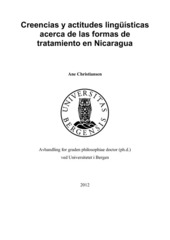| dc.description.abstract | The aim of this study is to describe and interpret the attitudes of Nicaraguans towards the use of the pronouns of address, based on a mentalist theory of language attitudes study. To reveal the attitudes, I present a series of written and social situations in which different pronouns are used, to a group of respondents divided in two sexes, three ages and three levels of education (based on the PRESEEA criteria), which later on is transformed into four categories of profession, to know the views of a socially complex about which pronoun of address is used in given situations and why. As the conative aspect (the use) of the pronouns of address is well studied in previous studies (Chavarría Úbeda and Rosales Solís (2010), Fontanella de Weinberg (1999) and Rey (1994, 1995 y 1997)), my focus is on the opinions of the respondents, not on the use of the pronouns. Therefore the study is based on interviews focusing the cognitive and affective aspects of the attitudes rather than on evidence of speech or closed questionnaires. However, to get a more complete picture some questions are also about their own use. I chose a very restricted part of the language, but also fundamental in the speech of Nicaragua, as it presents a significant opposition in mind of the conflict between the written norm, teaching and speaking. Most studies of language attitudes compare different languages, dialects or phonetic features, and I wanted to see if the same methods could be employed in a study based on a single syntactic-morphological feature in one place. The pronouns of address is a big issue which has caused some controversy in Nicaragua, and therefore it was interesting to try to reveal the attitudes of the people on a topic discussed by the intellectual elite. The results are presented in two ways: first quantitatively and then qualitatively. In the quantitative analysis the results are presented in tables, with the correlations in percentages where this is appropriate, and in the qualitative analysis the results are divided in opinions, beliefs and values of the different pronouns of address. The opinions and values can be considered the attitude aspects of the pronouns and the beliefs the explanation of some of them, an idea that comes from Torino de Morales, who consider the beliefs as responses of the speakers to explain their attitudes, and therefore it can be possible to derive a set of beliefs from attitudes displayed in the situations given in the interview questions. I have interviewed 49 people in total, and as everyone responds differently and give their own opinions, the material is quite extensive, as seen in Chapter V, relating to the results. The large variation in the responses required a qualitative approach in addition to the quantitative analysis. In the quantitative analysis I analyze the answers to the questions in their chronological order, while I in the qualitative part did not take into consideration the division of the different questions. Instead I appreciate the many expressions as such. While many of the answers are the same in the sense that the respondents answer for example tú or vos, their stated reasons can be quite different. I did not find sufficient common ground to quantitatively analyze all data, so this is only made with the questions where it was possible. Furthermore, the number of interviews is limited, and does not justify large generalizations. The main goal is not to expose all quantifications but to reveal some attitudes and beliefs that exist about the use of the pronouns of address. | en_US |
